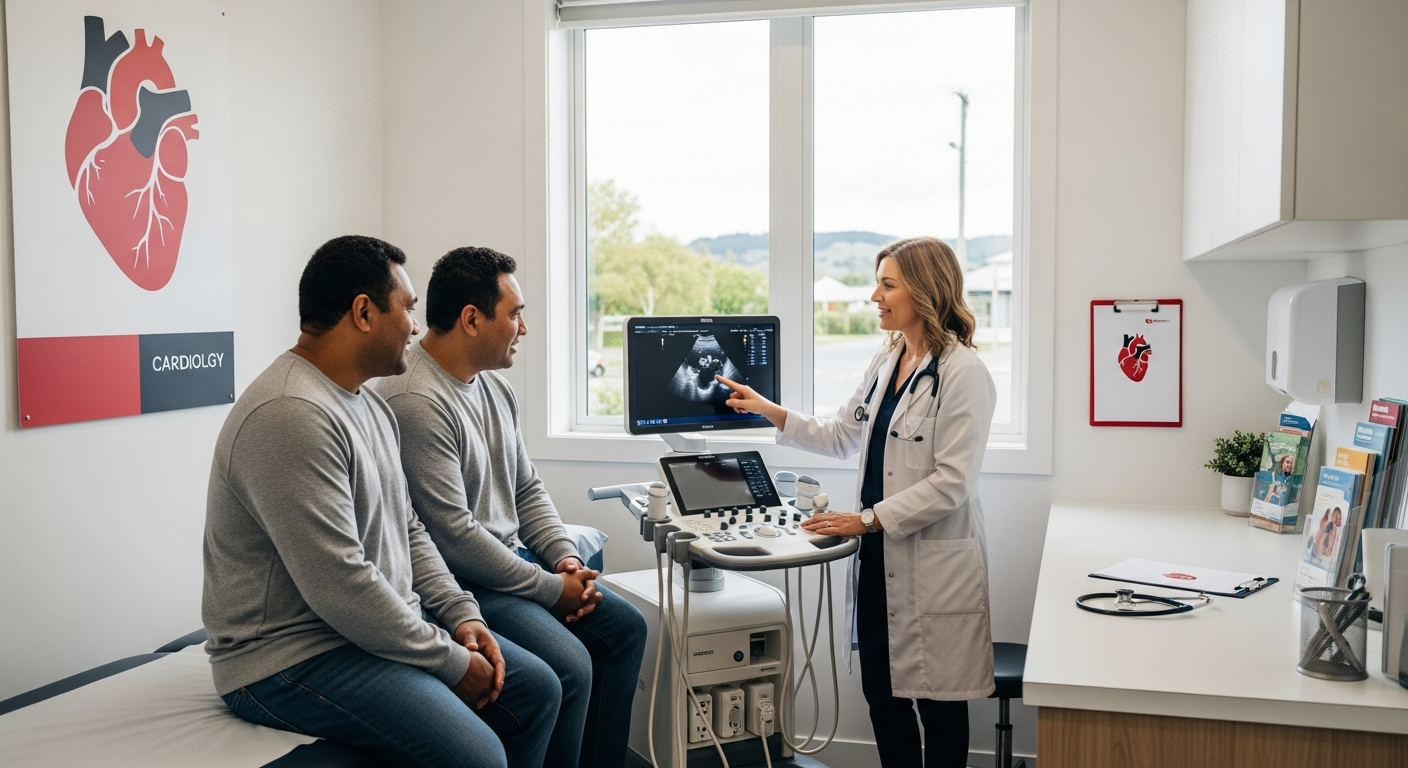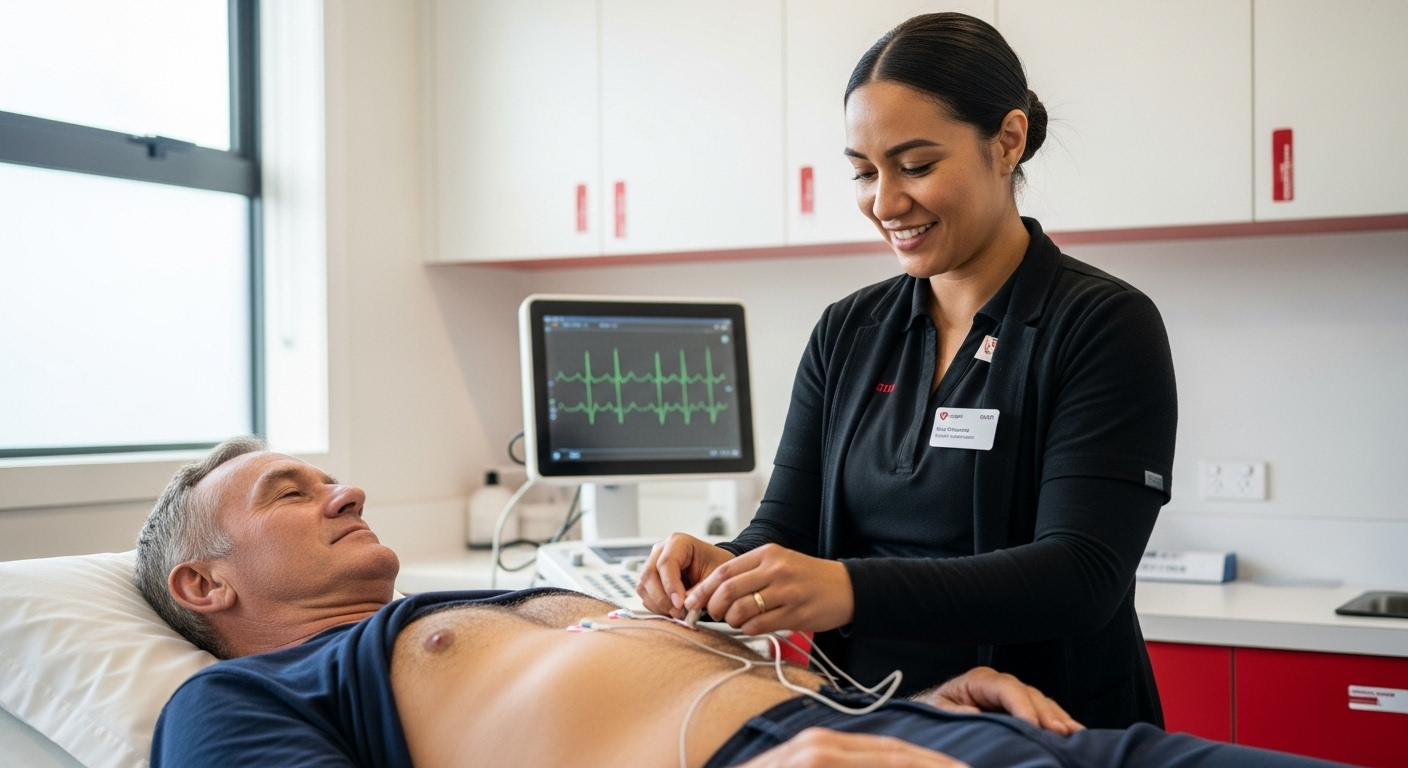Cardiology in Focus: The Specialist, The Science, and Your Heart's Health
A Patient's Guide to Cardiology: Understanding Heart Specialists and Your Health
Key Takeaways
- Cardiology is the medical specialty focused on diagnosing and treating disorders of the heart and circulatory system.
- A cardiologist is a specialist doctor who helps manage conditions like heart disease, high blood pressure, and arrhythmias.
- Every 90 minutes, a New Zealander dies from heart disease, highlighting the importance of proactive heart care.
- Many cardiovascular conditions can be prevented through lifestyle changes, and early diagnosis through tests like ECGs and echocardiograms is crucial.
_Disclaimer: The information in this article is for educational purposes only and should not be considered medical advice. Always consult with a qualified healthcare provider for any health concerns or before making any decisions related to your health or treatment._
Hearing the word "cardiology" can feel intimidating. If your GP has suggested a referral to a heart specialist, you might feel a mix of concern and confusion. What does it all mean? We believe that understanding your health is the first step toward managing it. That’s why we’ve put together this straightforward guide to demystify the world of cardiology and show you how we can be your partner in heart health.
The reality is that heart health is a significant issue for Kiwis. Every 90 minutes, a New Zealander dies from heart disease , and there are approximately 180,000 people across the country currently living with it. These aren't just numbers; they represent our family, friends, and community members. This is why proactive cardiac care is so important.
What is Cardiology?
Cardiology is the branch of medicine that deals with disorders of the heart and the circulatory system (your blood vessels). Think of a cardiologist as a detective for your body's most vital pump. Their expertise is focused entirely on keeping your heart working as it should, from investigating strange symptoms to managing long-term conditions. The field covers a wide range of issues, including coronary artery disease, heart failure, valve problems, and irregular heart rhythms. Our goal is to provide a clear diagnosis and a supportive plan to help you feel in control. For a deeper dive into specific conditions and the heart's function, our patient education resources are always available.
Why Would I Be Referred to a Cardiologist?
You might be referred to a cardiologist if your GP suspects a heart-related issue based on your symptoms, family history, or the results of initial tests. It’s a proactive step towards getting a specialist’s opinion. Common reasons for a referral include symptoms like chest pain (angina), shortness of breath, dizziness, palpitations, or a newly discovered heart murmur. A cardiologist has the advanced training and tools to investigate these symptoms, provide a precise diagnosis, and recommend the best course of action. Seeing a specialist doesn't automatically mean something is seriously wrong; often, it’s about gaining clarity and peace of mind.
The Burden of Heart Disease in New Zealand
Cardiovascular disease is a widespread concern in Aotearoa, but it doesn't affect everyone equally. Research shows that Māori and Pacific peoples carry the highest burden of cardiovascular disease in New Zealand , facing greater risks and inequities in care. Furthermore, heart disease significantly impacts women, with over 2,850 women dying from it in 2021. Recognising these facts is crucial for providing comprehensive cardiac care that is accessible and effective for everyone in our community.

What is a Cardiology Test For? Key Diagnostic Tools
Cardiology tests are used to assess your heart's structure, function, and electrical activity to help diagnose any potential disorder. These procedures are fundamental to modern heart care, giving us the information needed to understand your unique situation. They are typically painless, non-invasive, and provide invaluable insights. Here are a few of the core diagnostic tools we use at our clinic.
A 12-lead ECG (electrocardiogram) is a quick and simple test that records the electrical signals in your heart. It helps us detect cardiac arrhythmias and other abnormalities. At CardioLabs, a 12-lead ECG costs $93, and our rapid turnaround ensures your GP gets the results quickly to inform your care.
Another common procedure is an echocardiogram. This is a type of ultrasound that creates moving pictures of your heart, allowing us to see the heart muscle, chambers, and valves in action. An echocardiogram at our clinic costs $655, and for 90% of our patients, the results are sent to the referring GP within 24 hours. For longer-term monitoring, we also offer a 48hr Holter monitor for $412 and a 24hr BP monitor for $325.

The Power of Prevention: Taking Control of Your Heart Health
While diagnosis and treatment are a core part of cardiology, prevention is where patients have the most power. The great news is that you can significantly reduce your risk of developing heart problems. According to the Heart Research Institute of New Zealand, making lifestyle changes can prevent up to 80 per cent of premature CVD, stroke and diabetes. This is an incredibly empowering statistic.
Simple, consistent changes can make a world of difference. These include:
- Eating a healthy diet: Focusing on whole foods, fruits, vegetables, and lean proteins.
- Staying active: Aiming for regular physical activity that gets your heart rate up.
- Managing risk factors: Working with your GP to control high blood pressure, cholesterol, and diabetes.
- Quitting smoking: This is one of the single best things you can do for your heart.
Taking these steps puts you in the driver’s seat of your long-term health and wellness journey.
Your Partner in Heart Health
At CardioLabs, we see ourselves as more than just a diagnostic provider; we are your partners in comprehensive heart care. Our mission is to make cardiology services understandable, accessible, and reassuring for our Wellington community. A referral to a specialist is a positive step towards understanding your body and taking proactive control of your future. Your heart health is your greatest asset, and we're here to help you protect it with expertise and genuine care.







